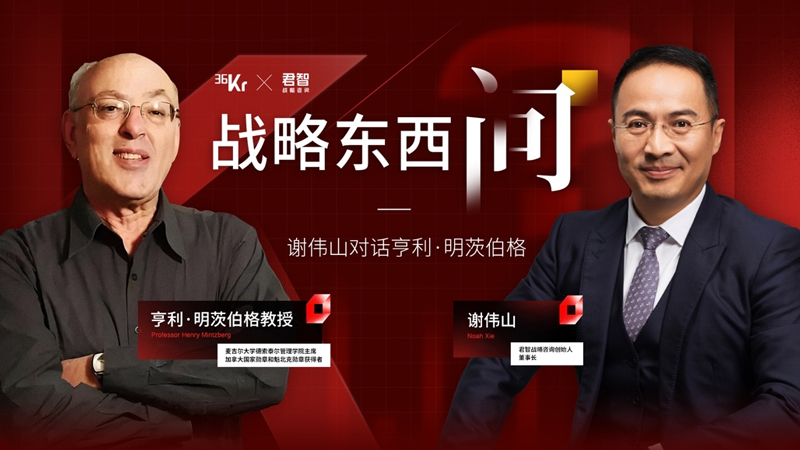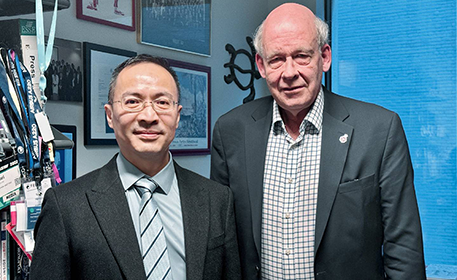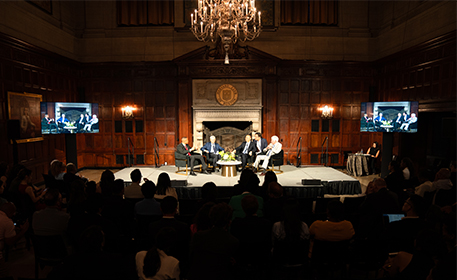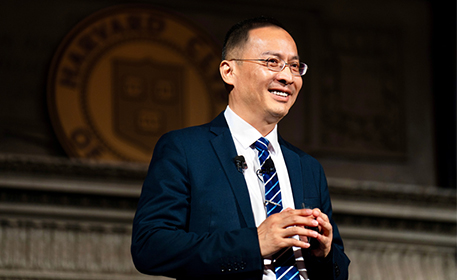Editor’s Foreword
Speaking of strategy, I believe there are two experts whose theories everyone can learn from, one is Michael Porter, and the other is Henry Mintzberg. Their master classes are the only two that you must attend in the corporate strategy field. Professor Mintzberg, who is quite a prolific writer, has written 21 books and his academic research has influenced many entrepreneurs’ thinking on development of strategy and organizational management.
In my opinion, the most impressive thing about Professor Mintzberg is that he can explain the essence of management with great humor, and he has a valuable quality that is often overlooked in the business world. Just like the kid in "The Emperor's New Clothes", he can often poke holes in the false pretenses that many managers revel in with conciseness and clarity.
After all, it takes profound business observations to infer from the unpalatable scrambled eggs in an airline's in-flight meal that the company's executives have started to ignore the voices of their customers. Interestingly, that very airline did eventually go out of business. Professor Mintzberg included this anecdote in his book as a warning to managers that real strategy does not emerge from a flash of inspiration in the boardroom; the voices from the front lines should never be ignored. The core competency of an entrepreneur is to discern value amidst the general noise to develop into strategy.
For instance, the original idea behind IKEA’s self-assembled furniture actually came from a worker’s suggestion to remove the legs of a table to facilitate more convenient transportation. However, it took IKEA's management another 15 years to streamline the process.
In the field of strategy consulting in China, there are few who can engage in a dialogue with Professor Mintzberg, and Noah Xie, the founder of Kmind Consulting, is one of them. This is not my first encounter with Noah; in last year's "Vision 2033" program, I heard a lot from him about strategic thinking and how to apply these insights to help businesses succeed. What impressed me the most was how he integrates Eastern philosophy, represented by The Art of War, into his practice. As we know, strategy consulting is a relatively new form of service for Chinese companies, and strategy research has long been dominated by Western academia.
Noah is treading a path less traveled, but intriguingly, he found a profound resonance with Professor Mintzberg in Canada. They both agree that strategy must learn in the midst of change and that the voices from the frontlines are more valuable than the stubborn views of some executives. To use Noah's analogy, it's like a table tennis player returning to the center line of the table after receiving a serve. In strategy consulting, the "center line" is, without a doubt, the needs of the customers.
Therefore, I invited both of them to the 36Kr live studio for a very interesting and profound discussion on strategy from Eastern and Western perspectives. In my view, they indeed share a lot in common, not only in their views on strategy, such as their knack for making simple and humorous analogies to explain complex strategic theories, but also in their steadfastness in facing today's rapidly changing world.
Pal Feng

We have picked some valuable takeways from their Q&A.
(PF-Moderator, 36Kr CEO; HM-Professor Henry Mintzberg at McGill University;
NX-Noah Xie, Chairman and Founder of Kmind Consulting)
01 Should strategy come from the top or the frontline?
PF: I noted from a statement that the person you admire most is the child in "The Emperor's New Clothes". May I then ask why, and what do you admire in him?
HM: The reason I admire the boy is not just because he said it, but because he saw it. And sometimes, we don't see the obvious and so I use him as a hero, a non-human hero, to say the important people sometimes are the ones who can see the obvious that other people don't see and they say it, so other people can wake up.
PF: I'm wondering if you feel that company managers, regardless in China, United States, Canada or other places, are in that emperor's state, where they don't actually know what's happening and don't know what's happening to them.
HM: Well, in every country there are people who do very well and are sometimes modest but they do very well. A story that I find interesting now is about Elon Musk with Tesla and Twitter, because Musk went into a business where he knew he built up a great company. He bought another company in a business that he didn't know. So “Forbes Magazine”, one of the famous business magazines in the United States asked me, some other people last year, who were the best chief executives of 2023 and who were the worst? I said Musk was the best and Musk was the worst, because he was maybe more modest or more grounded in Tesla and out of his range and experience in Twitter.
PF: Who is the person you admire most, Noah?
NX: I used to admire Sun Tzu the most, because I have been studying The Art of War for more than 20 years, and I think that Sun Tzu had very deep insights on how to understand competition. His methods are very different from the Western system of wisdom and thought. For many of the metaphors and inspirations in his book, he did not use empirical induction and logical deduction to discover the truth but adopted a systematic, and dichotomous approach to intuitively control the pattern behind certain wisdom with a blurred accuracy, so I think I learned a lot about the art of competition from it.
Just now, Mr. Mintzberg talked about "The Emperor's New Clothes". For such a fable, there is a similar idiom in China as well. We all know the phrase "to see through a brick wall", but it is followed by some very crucial words: "not seeing the wagonload of firewood". When a small animal is born in the fall, we can see the hairs inside very clearly, but when a large cart full of firewood is moving in front of us, we just can not see it. So what is it mean for us, as managers? Sometimes it can be hard for us to analyze something obvious, and to gain a deep understanding of it. So at times like this, managers are actually missing out on very, very great strategies.
HM: I agree with that, but I wanna add a point to it, which is sometimes the big thing comes out of a small thing, and great strategies sometimes come from very little hints, or very little ideas. The greatest furniture company in the world is perhaps IKEA, and IKEA is famous because it sells furniture unassembled. So you save money and IKEA saves money, and you take the furniture home in your car, and everybody is happy.
This big entrepreneurial idea came from a very little thing which was a worker tried to put a table in his car and it didn't fit, so he took the legs off. And then somebody said wait a minute if we have to take the legs off, so can our customers and that little idea became a great big strategy and that's often the case. And I think entrepreneurs function on the ground, they know what's going on with their customers and their markets. And they can pick up little clues and build them into big pictures.
02 How to define “Best Strategy”
PF: Professor Mintzberg, as companies usually have many idea and generate many ideas, how can managers then identify which ideas are valuable and which are not?
HM: Judgement, judgement! We can't substitute analysis for judgement. We need to analyze things, but you have a sense. This is an expression in English and maybe in mandarin too that you have a gut feel. They say entrepreneurs have a gut feel. In other words, they feel that something is right in their stomach, in their gut. And that's kind of judgment that comes from experience. So you listen to one person and you say I just don't think that's right. And you listen to somebody else, you say, I think there's something there, and good managers can tell the difference.
PF: Maybe Noah can talk a little bit about whether there is any underlying principal for discerning judging these many minute details and suggestions?
NX: This kind of phenomenon is pretty common when it comes to the formulation of strategy. Because strategy is difficult to plan from a top-down approach, it literally originates from the frontline. I usually use an analogy of playing table tennis. When playing table tennis, you will find that everytime the table tennis player hits out the ball, the will return to the table’s central line position.
In fact, to judge whether an innovation is effective or sustain its strategy, we must have this central line consciousness. The central line is all about whether I can capture and emphasize with the customers’ emotions, whether it builds on top of your previous foundation and to see whether you are constantly accumulating this recognition to strengthen this feeling, which is very important.
Going back to a piece of Chinese wisdom that states "Whoever wins the hearts of the people wins the world". In business competition, you will find that the real referee that determines the survival of your business is your customers. So what my position is in the customer’s mind, whether I can continue to win the favor of the customer and whether I can represent a unique value in the customer's perception are the “central line” factors that entrepreneurs need to especially pay attention to.
PF: Prof. Mintzberg, you've often mentioned that a good strategy is a synthesis process within organisation, as it's almost impossible to be derived from careful planning by senior managers. So I'd like to ask you, how do you define a great strategy?
HM: First of all, you don't know when you start, you probably start with the wrong strategy or you start with the seed of a strategy, but you gotta grow this strategy. So you have to keep adapting it and fixing it and changing it until you get it right. I love the story of a company in England where an engineer came up with a new way to make plate glass for big windows and things like that. And they spent seven years trying to perfect it. And they kept running into one problem after another. They wasted 100,000 tons of glass making it, but he said something very important. He said the reason we kept going is because we never hit a problem we couldn't solve. Every time we solved a new problem, we got a different problem, so we kept going.
Now, in the stock market, it's kind of like seven years. That's crazy. You should go out. At the end of seven years, they had the patent took over the whole business. So they had the courage to stay with it. Sometimes it takes time.
PF: What does the best strategy look like in your mind, Noah?
NX: I particularly agree with Mr. Mintzberg's point of view, that is, strategy is really dynamic, and it is very difficult for a company headquarter to derive strategy from mechanical planning, then ask subordinates to implement this strategy step-by-step. I observed that many companies that came to China to develop put their hands and feet in China, but left their brains in their headquarters, then they will lose drastically amidst the competition in the Chinese market. Actually, they have very good products, solid brands and also strong potential, but why do they falter in such a good market like China? It is because they call the shots a far distance away from their headquarters; Mr. Mintzberg has a very profound observation regarding this problem.
HM: About this topic, for instance you formulate in New York and you implement in Beijing or you implement in 1,000 villages all over China. It's a long way from my headquarter‘s building in New York and the problem is formulation and implementation being separate, because when the strategy fails, who gets blamed, it's always implementation that gets blamed. But the people who are blamed, the implementer, they can also turn around and say, if you're so smart, why didn't you formulate strategies that we implementers were capable of implementing?
In other words, when the strategy fails, it never fails just because of implementation, it fails also because of formulation. Because if the implementers couldn't implement, then the formulators didn't formulate to make it possible to implement.
So we have to break down the separation and realize like pingpong, you hit the ball, and the ball comes back, you formulate, and the implementation comes back, you go back and forth until you get it right.
PF: True, whether he's a management scholar or a strategy consulting firm, it's not possible for us to pack up a strategy like a book or pack up a report then hand this to you, and then you go along with it, right? It's just not possible because there are so many changes in the process. So I'd like to ask Noah what kind of role we should play as a strategy consulting firm in this process?
NX: As a consultant, I prefer to compare myself to a business coach, and my relationship with the firm is like the relationship between a coach and athlete. Improving an athlete’s physical ability is based on his established routine. However, each athlete’s daily condition varies, so you have to moderately adjust his training program to accommodate his condition. In addition, your competitive strategy is not the same towards different competitors.
Enterprises are also full of change, and a good strategy is not done overnight and definitely not about writing a good report. It must be aligned with the operation of the enterprise, to form a certain degree of correlation with its operational elements, that’s the first point.
Secondly, in the process of implementing, you have to adjust your strategy in time according to the changes in the market. The direction of this adjustment, as what Mr. Mintzberg previously mentioned, is that you have to listen to the voices at the frontline, the voices of consumers and pay attention to the frontline innovation. In the military, there is a very important saying "let the frontline call for fire", the voices on the frontlines are sometimes much more important than the thoughts and opinions formed by the entrepreneurs above.
03 How shall company cope with change?
PF: Noah, you must have been asked in China by clients on how to develop a strategy when the market changes. What do you think is a good methodology in developing strategy that can counter cyclical challenges?
NX: As the Chinese idiom goes, enterprises should " Be unmoved by the collapse of Mountain Tai, display no change in emotions when thunder erupts". They don’t have to care about the big changes. But there are some very unnoticeable, small changes, with which you can create a thunderclap out of nowhere, which is what a good strategy consultant can collaborate with the enterprise to accomplish.
Let me give you an example, 8 years ago, we met an electric two-wheeler company that was facing a huge challenge in the sense that the industry was facing price wars of up to 6 years with blood flowing into the river. The whole industry was involved. How should one cope with such a huge change? During that time, we told the enterprise to not care about and not adjust themselves according to this huge change.
I remember doing market research and asking an experienced shopping guide on the differences between customers of Yadea and others. He said that there are two types of customers. One group includes customers of renowned brands who are willing to pay a premium for quality, and the other group only cares about price.
So based on such a judgment, what lessons can be risen to the level of a strategy? We provided Yadea with the strategy of selling more high-end electric bicycles. I price my products a little more expensive than others, because my products are more durable, and it’s just this way that make Yadea, to surpass the top player in this industry in less than a year, and now for many years in a row, it has been the industry's number one brand, leaving its competitors behind.
For some of the bigger changes, because everyone can see them, they often form a mediocre strategy, but for the smaller changes, because not many people see them, if you dare to think independently, dare to make a judgment, it’s often because you took a different path that develops into a huge change.
PF: Professor Mintzberg, in one of your masterpieces called Managers NOT MBAs, you said that a good manager cannot be trained in the classroom, so I am curious how can managers improve in the real world?
HM: Management is a practice, it's not a science. There's some art, but there's a lot of craft. It's a practice. You can't teach a practice in the classroom. You have to learn management on the job just like you have to learn swimming in the water. So we created the IMPM, the International Masters Program for Managers (www.impm.org/china). We created that program to enable managers to sit at round tables, small round tables in a flat classroom and spent half the time sharing their experience with each other and learning from each other. I will lecture and I'll talk about strategies, learning and different forms of structure and so on.
But half the time it's over to them with their experience and learning from their experience. These are people who are managers. They know what management is. And then we created “Coaching Ourselves” to do much of the same thing but in house, so the website https://coachingourselves.com/ enables people to go in to take this kind of material in and work in small groups to change their company.
PF: I'm very happy to see that there are lots of brilliant interactions of ideas between these two strategy gurus from the East and West. So I would like to ask whether you two would like to ask each other a question? Let's start with Mr. Xie.
NX: Prof. Mintzberg, I would like to ask you a question - regarding a good strategy, what do you think are the few key points an entrepreneur needs to capitalize on?
HM: Listen, Listen, Listen, I think are the three points. Be in touch, know what's going on, pick up clues, look for the unexpected, look for the outliers, look for the customer who was doing something really strange instead of saying, that's strange, I can't deal with it. Maybe say that's an anomaly. If I can figure out why that customer is doing what they're doing, I may be able to come up with a really great new strategy. They say in real estate that the three clues are location, location, location. And in strategy, the three clues are being in touch, being in touch, being in touch.
My question to Noah, it’s really my question to everybody. What in the world is going on? Why is everything so crazy? Not just here or there or everywhere, there's just craziness everywhere. Why? I’m asking you to help me write my pamphlet because I’m writing a pamphlet called “For the Sake of Survival”. So Noah, perhaps you can help me answer the question.
NX: I may not be able to answer regarding the macro craziness, but a lot of enterprises are in a state of frenzy, many enterprises are at a loss as to what to do in the midst of such drastic changes. They do not know how to wiggle their way out, which is also a kind of insanity to some extent. So my answer to this question is that I think we still have to go back to the three key points that Mr. Mintzberg just mentioned, that is, to go back to the customer's feelings to solve the customer's turbulence. The feelings and choice of the consumers will converge into a huge torrent, and push this enterprise to thrive.






